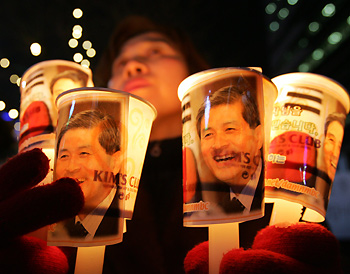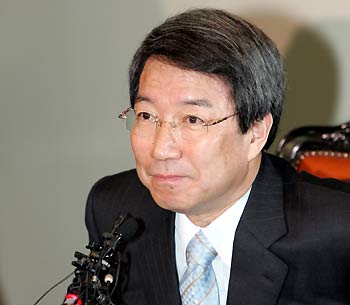|
South Korean prosecutors raid office of scientist
(Reuters)
Updated: 2006-01-12 09:06
Prosecutors raided the home and offices of disgraced South Korean scientist
Hwang Woo-suk on Thursday as part of a criminal probe into the alleged misuse of
state funds, South Korean media reported.
On Tuesday, an investigation panel at Seoul National University said a team
led by the once-heralded Hwang faked two landmark papers on embryonic stem
cells, but did produce the world's first cloned dog.
Hwang, who has been in seclusion since resigning from Seoul National
University on December 23, was expected to hold a news conference on Thursday
(0130 GMT) at which he will apologise for the wrongdoing at his laboratory,
South Korean media reported.

A South Korean supporter of stem-cell
scientist Hwang Woo-suk, who was a professor at Seoul National University,
holds candles at a candle light vigil in Seoul January 11, 2006. Hundreds
of supporters of Hwang gathered in central Seoul on Wednesday to insist
that the university give Hwang an opportunity to reproduce his
work.[Reuters] | The Seoul central prosecutor's
office said it obtained search warrants for 26 places related to the research
led by Hwang's team that included his home and office, a Seoul hospital from
which human eggs were procured and the homes of team members.
The prosecutor's office would not say whether any of the searches had been
carried out, but South Korean media said Hwang's home and office had already
been targeted.
A team of seven prosecutors was formed on Wednesday to look into the case and
wants to act swiftly to prevent tampering with any evidence, an official said by
telephone.

Chung Un-chan, president of Seoul National
University, speaks during a news conference at the university in Seoul
January 11, 2006. Chung apologised to the nation on Wednesday, for a team
led by South Korean scientist Hwang Woo-suk who fabricated two data on
embryonic stem cells. [Reuters] | It also expects to conduct interviews with all the main actors in the
scandal, the official said.
Prosecutors would not give details of their probe. Prior to the raids, they
said Hwang may be subject to a criminal probe and added they would also
investigate his claims that data was switched as part of a conspiracy to
discredit him.
The crime of fraudulently obtaining state funds can be punished by up to 10
years in prison, local media reported.
Hwang's research had raised hope for those suffering from debilitating and
deadly diseases because it seemed to hasten the day when genetically specific
tissue could be grown to help repair damaged bodies and cure ailments such as
severe spinal cord injuries and Parkinson's disease.
|